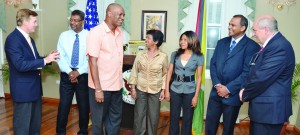The United States Agency for International Development (USAID)-funded International Republican Institute (IRI) officially launched the Guyana Leadership and Democracy Programme (LEAD) project on Wednesday evening, which is expected to bolster the functioning of the National Assembly.
The project, which was launched at Cara Lodge, Quamina Street, Georgetown, will focus on fortifying the National Assembly by encouraging consensus building; and working with civil society and the public to boost citizens’ engagement with the National Assembly and all parties to support the legislature’s role as an effective deliberative body.




